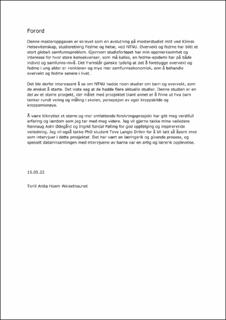Åtte-åringers helsekompetanse og deres opplevelse av egen helse
Master thesis

Permanent lenke
https://hdl.handle.net/11250/3022413Utgivelsesdato
2022Metadata
Vis full innførselSamlinger
Sammendrag
Bakgrunn Helseforståelse øker evnen til å kunne delta aktivt i å fremme, forebygge og behandle egen helsetilstand. Forståelse av helse-begrep og helseatferd utvikles i ung alder. Hvilken helseforståelse en har påvirker også ens vurdering av egen helse. Unge med overvekt har større risiko for negativt kroppsbilde, samtidig opplever også et stort antall normalvektige å ha et negativt kroppsbilde. Negativt kroppsbilde blant unge kan gi blant annet psykiske utfordringer, samt større risiko for økt vekt inn i voksen alder.
Formål Det finnes lite forskning på hvilken helseforståelse unge barn har. Samtidig er deres selvopplevde helse kartlagt i liten grad. Denne studien har som mål å få bedre innsikt i åtte-åringers helseforståelse, og samtidig kartlegge hvordan de opplever sin egen helse. Den økte innsikten kan veilede blant annet skolehelsetjenesten i kommunikasjon med unge barn om kropp og helse.
Metode I denne studien ble det benyttet et kvalitativt design. Det ble gjennomført individuelle semi-strukturerte intervju med 83 åtte-åringer, derav 41 jenter og 42 gutter. Deltakerne var fra fire ulike skoler i Trondheim kommune. Intervjuene ble tatt opp på diktafon og transkribert. Transkripsjonene ble analysert ved hjelp av Systematisk tekst-kondensering (STC).
ResultaterÅtte-åringene sier at kosthold og fysisk aktivitet er de viktigste faktorene for en god helse. Viktige faktorer som de ellers trekker frem er å ha gode venner og familie, gode følelser, være frisk og det å ha en normal kroppsstørrelse. Forutsatt at kropps-størrelsen har noe å si for helsen, sier de det er fordelaktig å ha en normal kroppsstørrelse. Store kroppsstørrelser blir vurdert til å være late og usunne. Ved vurdering av sin egen helse sier åtteåringene at de opplever den som god.
KonklusjonSammenfallende med tidligere funn og forskernes forventninger, sier åtte-åringene at kosthold og fysisk aktivitet er viktige faktorer for god helse. Sosiale og emosjonelle faktorer har også stor betydning, sier de. Som forventet er åtte-åringene opptatte av kroppsstørrelse, der de uttrykker at middels kroppsstørrelse indikerer god helse, mens stor kroppsstørrelse tyder på usunne levevaner og dårlig helse. Åtte-åringene sier at de opplever sin egen helse som god. Background The level of health conceptualization correlates to the ability to actively promote own health condition. The ability to take precautions and to treat own health condition also increases. Health conceptualization and health behavior evolves during young age. Health conceptualization impacts the perception of own health. Young people with overweight have shown to have increases risk of a negative body image. A large number of young people with normal weight also experience having a negative body image. Negative body image among young people can lead to psychological challenges, but also a greater risk of increased weight into adulthood.
Purpose There are few studies of young children’s health conceptualization. It is also limited research on young children’s own health perception. This study aims to explore eight-year-old children’s health conceptualization and their perception of own health. Increased understanding of this could benefit the school health service, in communication with young children about body and health.
Method This study is based on a qualitative design was used. Individual semi-structured interviews were conducted with 83 eight-year-old children, 41 girls and 42 boys. The participants were recruited from four different schools in Trondheim. All interviews were recorded and transcribed. The transcribed data were analyzed based on Systematic Text Condensation (STC).
Results The eight-year-old children express that nutrition and physical activity are the most important factors for good health. They also mention having good friends and family, emotional and social well-being and having a normal body size as important factors. When given a prerequisite that body size affects the health, the children say that medium body size would be preferrable for the health. A large body size is considered to indicate lazy and unhealthy personalities. When the eight-year-old children assess their own health, they perceive their health to be good.
Conclusion The eight-year-old children say that nutrition and physical activity are important factors for good health. This correlates with both previous findings and the researchers’ expectations. They also express that social and emotional factor are very important. As expected, the eight-year-old children are focused on body size. They express that medium body size good health, while large body size indicates unhealthy living habits and poor health. The eight-year-old children say that they perceive their own health as good.